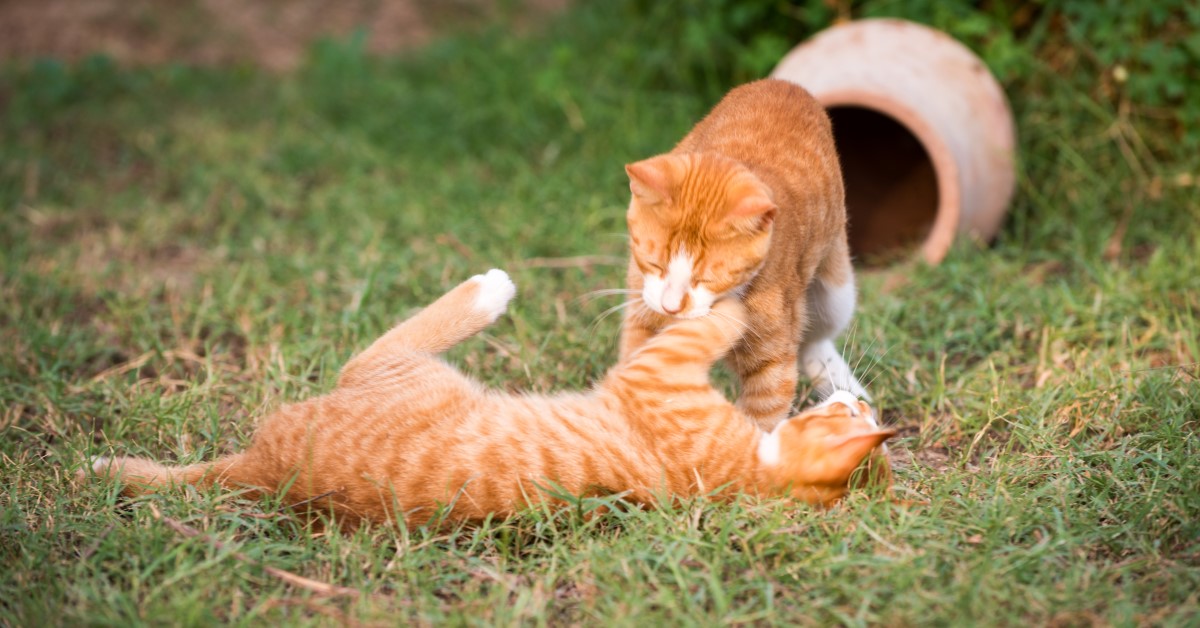Why Do Cats Fight? Advice for Pet Owners
A few smart strategies can help you keep your cats from fighting and restore household peace.

Cats don't usually mind being the sole pet in the house, but many of them appreciate having a regular feline playmate. Unfortunately, the opposite can also hold true when cats fight over territory or resources. If you have cats that fight regularly, you need to understand the reasons for this behavior and learn how to put a stop to it. The following steps should put you on the right path toward a more harmonious household.
Understand Why Cats Fight
As sensitive, intelligent animals, cats can experience interpersonal conflicts just like humans can. Even cats that normally get along famously can get aggressive with others. In many cases, normal play that includes a certain amount of roughhousing can escalate into genuine fighting if the cats get too excited. If this issue occurs infrequently, you may not need to do anything other than separate the fighting cats.
Fear also triggers aggression in many cats. If your cat feels directly threatened by another cat, it may lash out to protect itself. Once the cat learns not to feel this fear, the aggression should fade away.
Other reasons for fights represent more of a constant problem because they create ongoing grounds for aggression. Territorial aggression serves as a prime example, with cats often fighting over available space or food. A mother cat will turn aggressive against other cats that might pose a threat to her babies.
To understand why your cats are fighting, watch their interactions closely. Does one cat growl or hiss whenever the other enters its perceived "home base?" Is a litter of new kittens complicating the relationship? Is one cat simply scared of a new arrival in the home? Once you recognize the trigger, you can work on removing it.
Give Each Cat Its Own Space
Few changes can make a cat feel more threatened than the sudden addition of a second cat to the household. Since a little territorial aggression is only natural when you bring a new kitty home, you'll want to prepare the environment in advance. Create a space for the new arrival, complete with all the daily necessities, in a separate room. Place both cats' food bowls on either side of the door so the cats can sense each other's presence and get accustomed to it.
When it's time for the cats to meet face to face, put the new cat down instead of holding it just in case the other cat's claws come out. Supervise their interaction carefully and . separate them if you notice any significant aggression. Repeat these meetings until curiosity finally wins out over negative feelings.
This isolation does more than just give your cats time to become comfortable with each other -- it also counts as a smart wellness measure. The new cat might have a communicable disease or parasite that you don’t yet know about. To protect your other kitty, isolate your new cat until you can get it checked out (and, if necessary, treated) by your veterinarian.
No matter how long your cats have known each other, fights over food, water, and other resources can break out if there's any confusion over who owns what. For this reason, each cat should always have its own designated bed, food bowl, water bowl, and litter box in its own territory. If your cats become best friends and decide to share everything, let them come to that conclusion on their own.
Break Up Cat Fights the Right Way
Fighting between cats doesn't resolve the dispute in question. Whatever the cause of the squabble between your cats, you can't just let the animals fight it out. At the same time, you don't want to sustain injuries trying to play referee. Instead, take their focus off the fight through some visual or aural distraction, such as a laser pointer or a bottle cap clattering across the floor.
Your post-fight response can also make an important difference in the outcome. You should neither punish nor reassure your cat after a battle. Punishment only increases the sense of threat and fear, while reassurance may be interpreted as approval of your cat's bad behavior. Just focus on separating the cats for the time being.
Spay or Neuter Your Cats
Obviously, a spayed cat will never have reason to feel maternal aggression. However, the benefits of spaying or neutering go far beyond simple pregnancy prevention when you're trying to keep cats from fighting.
Sexually intact felines are flooded with aggression-promoting hormones during heat cycles. These hormones don't just make them cranky; they also boost feelings of territorialism, which in turn can lead to bouts of fighting. If you want to keep the peace, have your vet spay or neuter every intact cat in your home.
If the Fighting Won't Stop, Consult Your Veterinarian
Rest assured that most cats can learn how to live together in harmony, even if they never actually form a close bond of friendship. However, sometimes a deep-seated behavioral condition can interfere with the effectiveness of home-based behavior modification strategies. If cat fights continue despite your best efforts to stop them, make an appointment with your veterinarian to see whether any of your cats might benefit from medication or professional training techniques. In other words -- give peace a chance!
Ready to start saving money on pet wellness care?
Then take a look at Mint Wellness, the pet wellness plan that provides fast reimbursement on routine pet care. Save on vaccinations, wellness exams, preventatives, dental, and more!
Learn More


